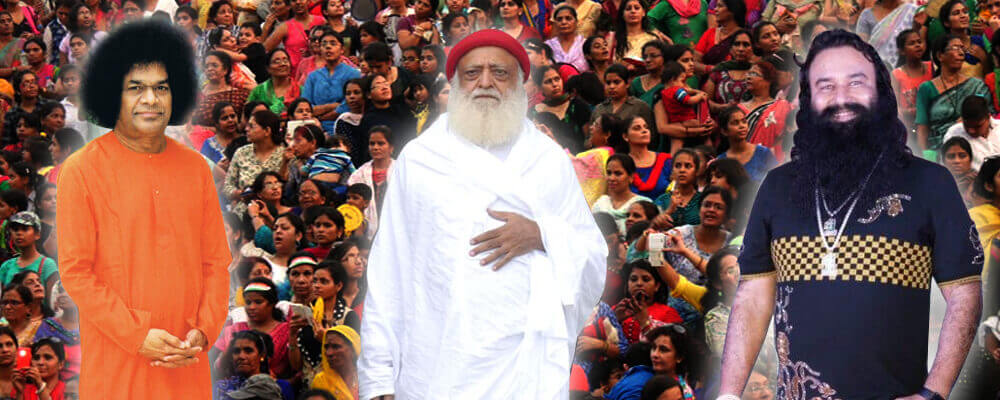Reason, Religion and Godmen! How do the 3 make or mar Indian Democracy? dr. james kottoor

 The writer of the article given below, Valson Thampu is a solid thinker and writer in national dailies and former principal of St Stephen’s College, New Delhi. He used to be occasional columnist of Indian Currents, Delhi when I was its associate editor with Fr. Xavier.
The writer of the article given below, Valson Thampu is a solid thinker and writer in national dailies and former principal of St Stephen’s College, New Delhi. He used to be occasional columnist of Indian Currents, Delhi when I was its associate editor with Fr. Xavier.
Even CCV has been publishing some of his thought provoking articles. Recently we have been discussing regularly subjects like secularism, religion, politics, democracy, human rights, equality of women with men, caste system and the role of Reason,(often rationalizing the irrational) used only as a fig leaf in all these areas. It is in this context that “Even God is misused in Theocracy” of the writer becomes very relevant.
Rationalizing the irrational?
The question whether Faith is above or under reason or should run in parallel lines supporting each other will continue for ever. But here below light of reason and conviction should guide each one of us mortals to take the next step forward. This is what we call freedom of thought and expression guaranteed by our constitution.
In this area CCV has been following the principle of Valtire: “I will go to death to defend your right to think, speak and write what you are convinced of, even when I may not agree one bit of what you have to say.” Only in such a atmosphere ‘frankly speaking’ and ‘disagreeing in an agreeable way’ can take place.
That is why we request our readers to give us the service of a ‘Devil’s advocate’ to learn from and not of flatterers to make us bask in their praise. We do not intend to hurt any one, but we cannot promise, no one will be hurt as in a friendly football match.
Any Meritocracy?
In the context of what is said above, is our Indian democracy becoming a theocracy, religiocracy, mobocracy, aristocracy, dynastycracy, or partycracy of umpteen number of parties none of whom practice internal democracy but end up as a one man show but never a ‘meritocracy’?
This happens in spite of the fact our democracy is founded on the rock bottom of public opinion, one man one vote, not found even in US the oldest democracy. For the US, they at lest, know to laugh at themselves by describing their democracy as a “Government of hypocrites by hypocrites for hypocrites.” To what extent that suits our democracy, our political parties and all of us, or most of us casting our votes for our caste, community, class and not for the person fit (merit) for the job?
The print and visual media are full of headlines on religious fundamentalism, terrorist attacks, human bombs, shoot outs to kill and maim, rape of innocents galore even by political leaders or so-called God-men. In the glamour worlds of Hollywood and Bolywood the talk of the town is about “Casting Couch” and so many of the victims are picking up courage today to come out in public with the banner “Me-too” to shame and corner the tiger in the woods or let loose in the open.
God and God-men
Lord Ram is incidental to Ram Temple even as lord Jesus is to Church and its imperial graded hierarchical wielders of power, office and title holders, matched by sky high concrete structures of chapels, churches, cathedrals and Basilicas. Poor Jesus, their role model, who emptied himself in a Cattle shed had none of it, not even a place to rest his head. That is what prompted us to call ourselves, CATTLE CLASS, some may be call it ‘tokenism’ or ‘fig leaf’ to cover our own partial or full ‘nakedness’.
Of course, as an affront to all this stands out Pope Francis throwing his lot always with the poor homeless migrants, speaking out daily for the marginalized and still living a simple life in the Vatican’s official guest house. But who cares to listen or imitate him in real life? The comfortable class among the hierarchy is up in arms against him which we often reported.
Priestly Class
Quoting Victor Hugo: “In the Hindu, Egyptian, or Romanesque architecture, one feels the priest, nothing but the priest, whether he calls himself Brahmin, Magian or Pope,” the writer infers, “Priests as a class express themselves best in stone…. No spiritual tradition in the world knows God as dwelling in any man-made structure, whether of stone, wood, or gold. Yet, building impressive cathedrals, temples and mosques has been the hallmark expression of priestly pride and grandeur….the common man is too brainwashed to see the obvious fact that God, the creator of the Universe, does not need to be a tenant of Pontiffs and Patriarchs.”
Valson’s articles provides a lot of food for thought like the ones from Varghese Pamplanil and his ilk. We are looking for more light than heat, more sense than sound from our readers and columnists! Give us your honest constructive suggestions to take our next step forward to enlightenment, and not to the age of darkness, as described by TJS George in his article. james kottoor, editor ccv.
Please read below Valson Thampu in new Indian Express
Even God is misused by a theocracy – Published in New Indian Express 07th May 2018
Religious fundamentalism is a throwback to the pre-rational phase of religion. It has a genius for misrepresenting regression as progress.
Civilisations, we are told, start as theocracies and end up as democracies. This is a historical fact, and it needs to be heeded, even if the mouthpieces of theocracy clamour, “faith is above facts”.
For a democracy to regress to theocracy is thus disastrous, like progressing from determining truth through an examination of evidence to divining it by the entrails of birds, as in ancient Athens.
The seductiveness of the past lies sleeping within us, ever ready to wake up. Its allurement increases with the bewilderment we experience in the face of emerging challenges. Religious fundamentalism is a throw-back, liveried in the idioms and jargons of modernity, to the pre-rational phase in the practice of religion. It has an uncanny genius for misrepresenting regression as progress. So it is particularly important in times like ours, to see through such confusions.
The theocratic scheme of things is distinguished from its democratic counterpart by the marginalisation of the people and their degradation into tools to be used at will. In such a context, the invocation of demographic-dividend entails no commitment to empowering citizens. It scorns the respect that democracy ascribes to the worth of all human beings. Theocracy marginalises and uses people callously because God himself is misused by it. Recall, for an illustration, the euphoric assertion of a protagonist of the Ram Janmabhoomi movement in the wake of the destruction of the ‘disputed structure’ in 1992. Even if Lord Ram were to come in person and ask us to give up, he declaimed, the mandir will be built. That’s to say, Lord Ram is incidental to Ram Mandir, as Jesus is to Christendom.
The pantheon of theocracy is presided over by Pontiffs. Since by itself the priestly oligarchy does not command material power and resources, theocracy deploys a priest-politician collaboration. The power struggle in religious history has been between God and priests. Priests killed Jesus. In religion, God’s plight is hopeless. In the Middle Ages, when God was superseded by Papacy. Allah lost the battle to violence-spewing, reason-hating mullahs. Roughly the same pattern peeks at us from Ayodhya.
Priests as a class express themselves best in stone. “In the Hindu, Egyptian, or Romanesque architecture,” wrote Victor Hugo in The Hunchback of Notre-Dame (1831), “one feels the priest, nothing but the priest, whether he calls himself Brahmin, Magian or Pope.” No spiritual tradition in the world knows God as dwelling in any man-made structure, whether of stone, wood, or gold. Yet, building impressive cathedrals, temples and mosques has been the hallmark expression of priestly pride and grandeur. This anomaly goes unnoticed only because the common man is too brainwashed to see the obvious fact that God, the creator of the Universe, does not need to be a tenant of Pontiffs and Patriarchs.
What happens when a class of people get used to embodying their power in stone? They become insensitive like stone. Let us take Henri Bergson’s help to understand this somewhat. In Creative Evolution (1905), he argues that human nature has an instinctive preference for the solid, as against the liquid and the aery, which are more akin to the life principle. That is because the solid is susceptible to human control. Rock is harder in comparison to water or air; but it is a lot easier to embody man’s will and pride in stone than it is in water or air. Stone is death; soul is life. Theocracy, being a scheme of things centred on priestly hegemony, has a natural preference for stone over soul, worldly power over humane ideals. In a theocracy, a place of worship is at once a palace and a prison for God.
What undermined theocracy all over the world was the rise of freedom of thought and the broad-basing of knowledge; in one word, Enlightenment. Nothing rattles priestly hegemony more decisively than the enlightenment of the people. Small wonder, theocracies suppress free-thinking as heresy, and align themselves with agents of regression. What should concern us as citizens of a democratic Republic is the devastation that our intellectual culture is bound to suffer, if the charioteers of theocracy are allowed to have their way.
Consider the ‘development’ being commended to us and ask, isn’t it illogical that this fanfare co-exists with unprecedented hostility to liberal intellectual culture, marked by freedom of choice and expression? We have never before been as intolerant of free-thinking as we are today. All over the world, nations progressed only through free thinking and an unregimented flow of knowledge. Theocracy and development are mutually exclusive.
It is inevitable, therefore, that the popularisation of modern education is strongly distrusted in a theocratic state, of which Malala of Pakistan is a familiar illustration. Centres of liberal education are bound to come under disfavour. The tower of development under construction today is a materialistic project, to which the resources of the heart and soul are deemed superfluous.
The history of the economic progress of the West tells a different story, though. Printing, not extravagant enterprises in steel and stone, says Alvin Toffler in Future Shock (1970), has been its driving force. Prior to 1500 AD, Europe was producing 1000 books per year. By 1950, it shot up to 1,20,000 titles a year. The output of scientific and technical literature in the US alone touched, by mid-1960s, 60,000,000 pages a year. Small wonder, America rules the world.
All that we do, to cover up our intellectual poverty, is to tom-tom ‘make in India’ which, de-constructed aright, means that we have little of our own to bank on. We want wealth without the intellectual under-pinning it demands. Regression to theocracy may camouflage this bankruptcy; but it will degrade us into a colony for the enterprises and interests of the purveyors of technical and scientific development.
















